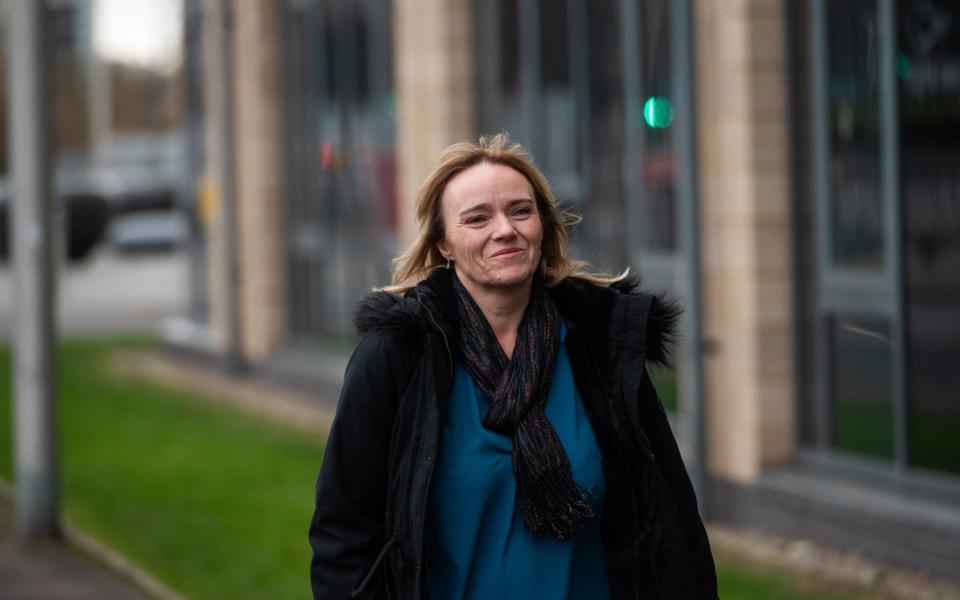The NHS trust at the centre of a row over a transgender doctor who used a female changing room in a hospital has received a warning from Britain’s equalities watchdog.
The Equality and Human Rights Commission (EHRC) wrote to NHS Fife and the Scottish Government in the wake of a landmark employment tribunal about the right of trans people to access female-only areas.
Health board chiefs accused nurse Sandie Peggie of misconduct after she challenged the presence of Dr Beth Upton, who was born male but identifies as a woman, in female facilities at Victoria Hospital, Kirkcaldy.
Baroness Kishwer Falkner, the commission’s chairwoman, said the watchdog had “reminded” NHS Fife of its obligations about the provision of single-sex spaces.
ADVERTISEMENT
She said the EHRC had highlighted the Workplace (Health, Safety and Welfare) Regulations 1992, which state that changing rooms will not be suitable “unless they include separate facilities for, or separate use of facilities by, men and women where necessary for reasons of propriety”.

In a further extraordinary development, she said the commission had demanded a meeting with Neil Gray, the SNP Health Secretary, over forthcoming NHS Scotland guidance on trans issues.
It emerged this week that the guide, which is to be rolled out across the Scottish NHS, warns that telling a trans person they cannot use their “preferred facilities” could amount to “unlawful discrimination on the grounds of gender reassignment”.
The EHRC intervention was deeply embarrassing for both NHS Fife and First Minister John Swinney, only 24 hours after he told the Scottish Parliament that his government was complying with the law on access to female-only areas.
ADVERTISEMENT
The Telegraph disclosed this week that the Scottish Government allows its trans employees to use whichever toilets they are “most comfortable with”, regardless of whether they have changed legal gender.
A ‘right’ to access female single-sex spaces
However, an expert academic warned that the policies were a “clear breach” of the 1992 regulations’ requirement for separate communal changing and lavatory facilities for male and female workers.
Dr Michael Foran, of Glasgow University, said the definition of women for the purposes of the regulations did not include biological men who self-identified as a different gender.
The employment tribunal in Dundee heard that Ms Peggie was uncomfortable sharing female facilities with Dr Upton, including an incident in which she needed to use the changing rooms urgently due to heavy menstrual bleeding.
ADVERTISEMENT
Dr Upton is understood not to have had a gender recognition certificate at the time, which would have strengthened a legal case to access women’s facilities.
But the tribunal heard that NHS Fife ruled that Dr Upton had a “right” to access female single-sex spaces as the doctor “identifies as a woman”.
‘Protect individuals from discrimination’
Baroness Falkner said: “Today we reminded NHS Fife of their obligation to protect individuals from discrimination and harassment on the basis of protected characteristics, including sex, religion or belief and gender reassignment.”
She added: “We have requested that NHS Fife provide us with a copy of any equality impact assessment relating to the provision of changing facilities for staff; any information relevant to how such policies have been kept under review; and any details on steps taken to ensure that the rights of different groups are balanced in the application of these policies.”
ADVERTISEMENT
She said the 1992 regulations had also been highlighted and warned it was also important that the forthcoming NHS guidance, and all the policies that rely on it, “faithfully reflect and comply with the Equality Act 2010”.
“We have asked to meet with the Cabinet Secretary to discuss the Scottish Government’s role in ensuring that NHS Scotland and other bodies meet their legal obligations under the Equality Act,” she said.
‘These flaws did not exist’
Feminist groups warned the Scottish Government in a letter on Tuesday that the NHS Scotland guidance misrepresented the Equality Act and was legally wrong.
Helen Joyce, director of advocacy at human rights charity Sex Matters, said: “It was extraordinary to then see the Scottish First Minister stand up in Holyrood on Thursday and refer to the guidance as if these flaws did not exist.
“The EHRC’s speedy intervention is a clear sign that in defending this error-strewn guidance, John Swinney was committing as serious an error of judgment as when his Health Minister, Neil Gray, said that the leadership of NHS Fife had his ‘full confidence’.”
Self-ID has continued to operate in parts of Scotland’s public sector despite Nicola Sturgeon’s legislation to introduce the controversial system being blocked by the UK Government.
‘All relevant organisations to comply’
Sir Alister Jack, the former Tory Scottish Secretary, vetoed the Gender Recognition Reform (GRR) Bill over concerns about the UK-wide impact on women’s safe spaces.
An NHS Fife spokesman said: “We acknowledge the letter from the Equality and Human Rights Commission and note its contents. We will respond fully to the commission in due course.”
A Scottish Government spokesman said: “We will respond to this letter in due course.
“The Scottish Government expects all relevant organisations to comply with the requirements of the Equality Act 2010.
“As employers, organisations may need to consider the impact of other legislation, such as the requirements of the law on health and safety in workplaces.
“The Scottish Government supports the separate and single-sex exceptions in the Equality Act 2010, which can allow for trans people to be excluded when this is a proportionate means of achieving a legitimate aim.”
EMEA Tribune is not involved in this news article, it is taken from our partners and or from the News Agencies. Copyright and Credit go to the News Agencies, email news@emeatribune.com Follow our WhatsApp verified Channel




